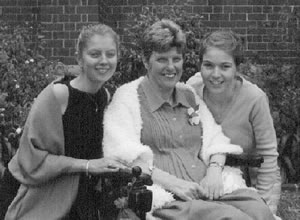
In 1966, Rosalind Nicholson, aged only 17, began to study for a teaching career at Bathurst Teachers’ College. That same year she suffered a spinal cord injury which resulted in quadriplegia.
Ros was staying with her friend, Barbara, on a farm on the outskirts of Sydney where she went for her first horse ride. A dog barked, the horse shied, and Ros fell. And her life changed forever.
But Ros refused to be overwhelmed by her injury. After 18 months in the Royal North Shore Hospital, she returned to the family home in Broken Hill where the hospital’s Assistant Matron developed a rigorous daily care and physiotherapy regime.
With a team of carers, Ros’ parents, Jack and Elaine, followed the regime diligently. And when Ros died 40 years later, Jack, aged 91, was still helping with her daily physiotherapy routine. Jack passed away at 97 in 2012.
With Jack and Elaine’s support, Ros became an active member of the local community. She gained arts and economics degrees from the University of New England, became an accountant and managed the family’s companies. She tutored high school students in mathematics, visited the sick in hospital, and was a spokeswoman for the Year of the Disabled.
After Ros acquired her first motorised wheelchair, there was no stopping her. With new independence she visited friends, and took trips outdoors, to the cinema and shops.
Ros died in 2006 but her legacy lives on.
Jack’s retirement fund (and later Elaine’s estate) funded a Trust to support Ros’ care. Today, the Trust supports many spinal cord organisations, and also Allowah Children’s Hospital in Dundas. The tradition of giving continues through Ros’ brother, Robert, and his wife Shirley who now administer the trust. SpinalCure Australia is a proud beneficiary of the Nicholson family’s generosity.
“We know that Ros would have wanted to make a donation to SpinalCure Australia, and we hope our donation will support spinal research that benefits people like her into the future,” says Robert.
And it will. Donations and bequests to SpinalCure directly support research – research that will help us win the fight against paralysis caused by SCI.
